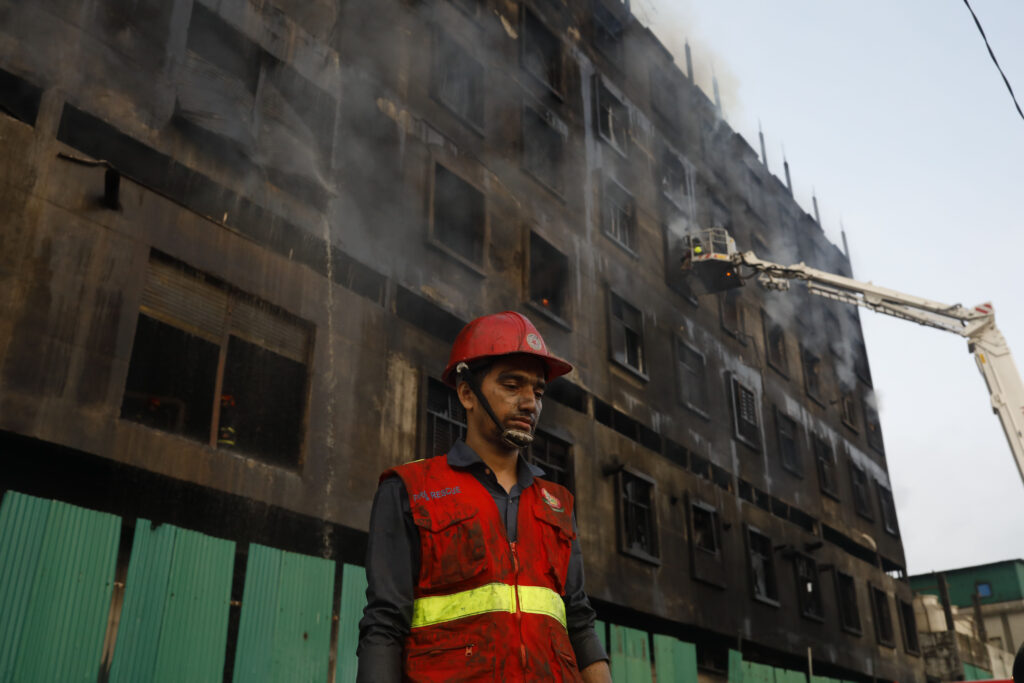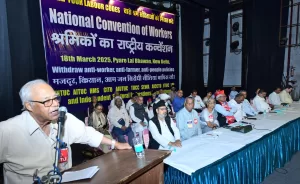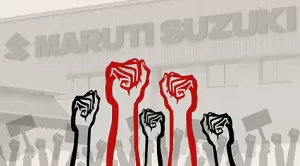❈ ❈ ❈
Bangladesh Factory Fire Kills Dozens of Workers Locked Inside
Kenny Stancil
A massive fire engulfed a food processing factory overnight in Bangladesh, killing more than 50 people and injuring at least 26 more, with additional workers still suspected to be inside the building after being trapped by an illegally locked door, officials said Friday.
After flames erupted Thursday around 5:00 pm local time on the ground floor of the seven-story Hashem Foods and Beverage factory in Rupganj—part of the Narayanganj district located about 12 miles southeast of Dhaka, the nation’s capital—firefighters spent the entire night battling the blaze, which was reportedly still burning nearly 24 hours later.
“Three people died from jumping off the building to escape the fire and 49 charred bodies have been recovered so far,” Mustain Billah, the administrator for the Narayanganj district, told Reuters by phone from the scene.
While the cause of the fire remains unknown, Billah said that “it is still burning on the top floor. Firefighters are struggling to control it, as chemicals and flammable materials were stored inside the building.”
Once most of the fire had been extinguished on Friday afternoon, rescue teams “discovered piles of bodies” inside the building, the Associated Press reported, causing the known death toll to surge from three to 52. According to Debasish Bardhan, deputy director of the Fire Service and Civil Defense, the top two floors of the factory have not yet been searched, meaning that further casualties are likely.
“The main exit of the factory was locked from the inside and many of those who died were trapped,” AP reported, citing Bardhan. Abdullah Al Arefin, a district fire service official, corroborated Bardhan’s account when speaking with Reuters.
More than two dozen workers sustained injuries while jumping from the upper floors of the factory.
“We rescued 25 people after setting a ladder to the rooftop,” Bardhan told Reuters. “We could have saved more if others could reach the rooftop.”
Mohammad Saiful, a factory worker who escaped the fire, told Agence France-Presse that there were dozens of people inside when the fire started.
“On the third floor, gates on both stairwells were closed,” said Daiful. “Other colleagues are saying there were 48 people inside. I don’t know what happened to them.”
According to AP, it is still unclear how many people were in the building and how many are missing. Citing local authorities, the New York Times reported that “at least 200 people were working in the building when the fire broke out.”
“For now, we only have these details,” said Bardhan. “After searching the top floors we will be able to get a complete picture.”
The Bangladeshi company that runs the factory is a private subsidiary of the multinational Sajeeb Group, which produces juice under Pakistan’s Lahore-based Shezan International brand, AP explained. The mango fruit drinks manufactured at the factory are sold in the United States, Australia, Malaysia, Singapore, India, Bhutan, Nepal, and several additional countries in the Middle East and Africa.
“When will factories stop locking in workers in unsafe conditions?” asked Kavita Krishnan, a communist feminist activist and author from India. “When will companies stop outsourcing slavery/sweatshops to Bangladesh, India, Vietnam, etc.?”
Bangladesh, where the inadequate enforcement of safety regulations leaves a highly exploited workforce vulnerable to hazardous conditions, has experienced several industrial disasters over the past decade, including fires that killed workers locked inside factories. Millions of Bangladeshis are employed in the textiles sector, many producing goods widely sold in the West.
The South Asian nation’s most deadly workplace disaster in recent memory was the 2013 collapse of the Rana Plaza garment factory outside Dhaka, which claimed the lives of more than 1,100 workers, many of them children.
Progressives around the world have routinely implored the wealthy transnational corporations that exploit the labor of people in Bangladesh and other low-wage countries to prevent future catastrophic incidents by improving working conditions.
(Courtesy: Common Dreams, a US non-profit news portal.)
❈ ❈ ❈
Yet Another Murder of Workers by Capital
Capital’s absolute disregard for life once again surfaces in Narayanganj, Bangladesh, where 52 workers have been burnt to death on 9 July 2021, after they were denied exit when fire broke out in the food-processing factory which had almost no fire-safety mechanisms installed. Many more are injured and struggling for life in burn units.
The factory employed child workers as well. The number of children victims is yet to be determined as the bodies are burnt beyond recognition.[1]
Upon inspection by officials of the fire safety department, more evidence of negligence and non-compliance have emerged.[2]
Md. Abul Hashem, chairman and managing director of Sajeeb Group, the corporation that owns the factory, denied any responsibility for the incident.[3]
However, on 10 July 2021, Mr. Hashem, along with 8 other senior officials of the company were arrested on a murder-case filed by the Bangladesh police in connection with the factory fire.[4]
This act by the establishment, confirms allegations of “murder by negligence”, raised by conscious citizens in social media.
Individual activists have taken to social media calling for a boycott of products of the Sajeeb Group, which includes beverages and snacks.
However, the prospect of legal battles and individual activism seems dim, as far as the question of ensuring justice goes.
Last year, Sohel Rana, the owner of Rana Plaza that collapsed in 2013 and killed more than 1,100 people, was granted bail on a corruption case related to the building collapse.[5]
Delwar Hossain, the owner of Tazreen Fashions Limited where a fire killed 117 people in 2012, had also been granted bail on a case related to the fire.[6]
After more than a month of protest in demand for justice and reparations, the victims of the Tazreen fire were forcefully evacuated from the ground they were staging their sit-in, in December 2020.[7]
Isn’t justice being delayed? Aren’t reparations being refused?
It would thus be foolish to forgo the culpability of ruling power as a party to capital’s acts of exploitation, negligence and subsequent murders.
Efforts by local and international organizations along with government bodies, for ensuring safety for workers in factory buildings of Bangladesh, have yielded little results. According to a report in Dhaka Tribune,
“The authorities promised better safety standards after the collapse of the Rana Plaza building, which killed more than 1,100 workers and injured hundreds in 2013 in Bangladesh’s apparel industry’s biggest disaster.
“The collapse led to better labour conditions and tougher safety rules. But many local industries failed to maintain safety compliance, leading to accidents each year.
“Tragedies of past and present have often been attributed to safety lapses. Deadly fires have plagued Bangladeshi factories – namely apparel fires reached a five-year high in 2020 – showing bad days will not be over if the industry is allowed to return to past practices.
“In 2020, the country saw 383 industrial fires; 273 of them occurred at apparel factories, according to the Bangladesh Fire Service and Civil Defence.
“Between 2012 and 2019, there were more than 150 fires and other safety incidents connected to Bangladesh’s apparel industry, killing more than 1,300 people, and leaving 3,800-plus people injured, according to the Solidarity Center.
“At least 2,000 workers and other staff died in at least 26 blazes in factories over the past two decades, according to the International Labour Organization.
“The last five years saw 5,834 industrial fire incidents, which caused a financial loss of Tk250 crore. Dhaka division reported the highest industrial fires and Sylhet the lowest, according to the Bangladesh Fire Service and Civil Defence.
“At least 52 people died in a fire Thursday at an industrial building in Narayanganj, the latest industrial disaster in the country.
“In July 2019, six employees of a spinning mill in Gazipur were killed in a factory fire; and 13 in a boiler explosion in 2017 in the same area.
“In January 2015, at least 13 people died in a plastics factory fire in Dhaka.
“In 2016, a fire triggered by a boiler explosion at Tampaco Foils Ltd in Tongi killed at least 25 people. Also, a fire broke out in a sweater factory in Gazipur the same year, killing at least four workers.[8]
The capitalists regard the workers as mere appendages to factory machineries. No amount of emotional appeal to the capitalists’ “conscience” will change their perception.
Capital knows no mercy. It is a tyrant in pursuit of absolute control; if it makes compromises, it does so only for the time being, so that it can regroup and wage a fiercer counter-attack on the working class; if it appears to be docile, then it does so only because it is honing its knife of treachery.
Without effective resistance from the working class, this tyrant will not stop the slaughtering of workers. History forbids us from doubting the power of workers. But, history does also elicit a sense of urgency among us. We hope this sense of urgency will not go in vain.
Notes
1. https://www.dhakatribune.com/bangladesh/2021/07/10/narayanganj-factory-fire-many-child-workers-still-missing.
2. https://bdnews24.com/bangladesh/2021/07/09/hashem-foods-factory-lacked-fire-safety-system-official.
3. https://www.thedailystar.net/news/bangladesh /accidents-fires/news/i-didnt-set-the-fire-sajeeb-group-chairman-denies-responsibility-narayanganj-fire-2125891.
4. https://www.thedailystar.net/news/bangladesh/accidents-fires/news/narayanganj-fire-sajeeb-group-chairman-4-sons-among-8-detained-2126436.
5. https://www.dhakatribune.com/bangladesh/court/2020/06/08/hc-stays-rana-plaza-owner-sohel-rana-s-bail.
6. https://www.thedailystar.net/opinion/the-sound-and-the-fury/news/why-are-former-tazreen-workers-still-the-streets-1987689.
7. https://www.thedailystar.net/opinion/the-sound-and-the-fury/news/why-are-former-tazreen-workers-still-the-streets-1987689.
8. https://www.dhakatribune.com/bangladesh/2021/07/10/factory-fires-bangladesh-s-recurring-nightmare.
(Omar Raad Chowdhury is a student of University of Dhaka, Bangladesh. Courtesy: Countercurrents.org.)




